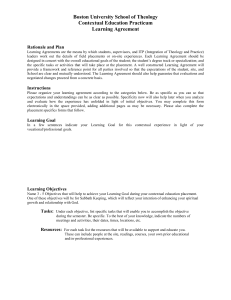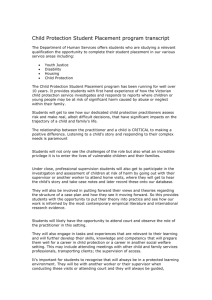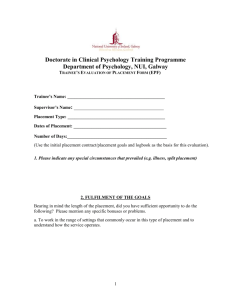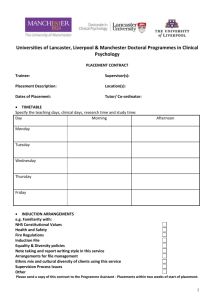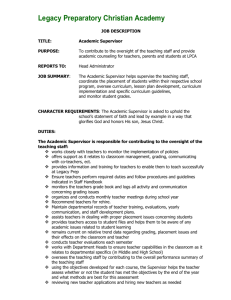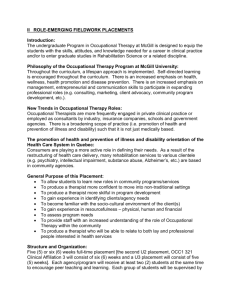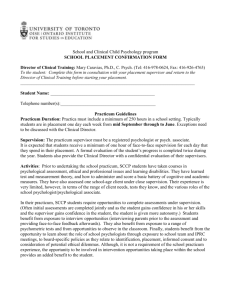4 Extending the Boundaires of Practice Learning – Theresa Baxter
advertisement
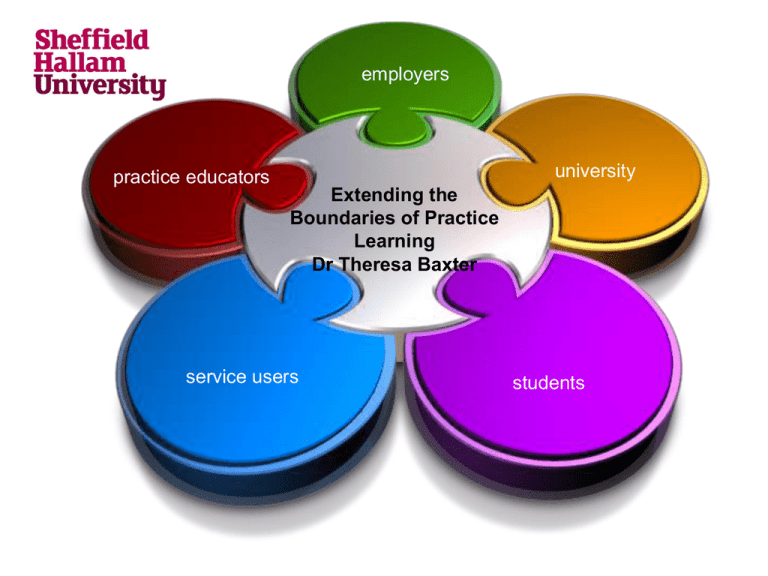
employers university practice educators Extending the Boundaries of Practice Learning Dr Theresa Baxter service users students Extended Scope Placements • The emergence of new roles for Occupational Therapists is a global phenomenon. • Within the UK, OTs are increasingly employed in nontraditional settings, often within the third sector. OTs in these settings work with a greater amount of autonomy and independence, as they are often the only OT within a setting. Opportunities & Benefits for students, service, service users • Students will graduate with confidence and equipped in service development, making them the ideal new generation of OTs to take up the emerging employment opportunities, and further expand the profession enabling more people to benefit from rehabilitation and reablement outside traditional statutory provision. Examples of placement opportunities Areas of Opportunity Clare Lodge is a leading national provider of secure accommodation "welfare" only placements and the only all female unit in the UK. Sooper Troopers a registered charity that supports young people 16 and over to develop confidence and self esteem performance arts Practice Example • Reach(Southwell Project) - Nottinghamshire 'Our mission is to support Adults with Learning Disabilities to achieve and sustain the best possible quality of life within their local community' • 2 Students placed for 12 weeks - Level 5 • Long arm supervisor - Team leader Learning Disabilities LPFT • On Site Supervisor What the Students bring... • • • • Occupational Focus Grading/Activity analysis Assessment tools Evaluation tools What the students gain... • • • • • • Confidence/Autonomy Insight New Ways of working Collaborative working skills Understanding of voluntary organisations OT Professional identity What the students said... 'Being on a non-traditional placement felt scary at times but I can honestly say that I developed more as a student and a person over the 12 weeks I was there, than I did over the course of both my previous placements combined. It wasn't always comfortable but it was an excellent preparation for being out in the real world of work.' 'Undertaking a placement in a setting where people had no clear understanding of the role of occupational therapy, made me develop a stronger sense of my professional identity. I couldn't assume that people knew why I was doing what I was doing. I not only had to make sure I understood the rationale behind my actions but I had to articulate it clearly to others in a way that was easy to understand.' Beth & Clare 2014 Supervision 'Being on a non-traditional placement helped me to understand the true value of supervision and reflection. Because I didn't have immediate access to a supervisor, I prepared well for my supervision sessions and used them to the max. I was needy to start with but as time went on and my confidence grew, I was able to let go and trust my own judgement more.' 'The supervisor/supervisee relationship is always important but it is essential in the context of a non-traditional placement to have a supervisor who is fully committed to the process. My supervisor supported and challenged me in equal measures. Between our weekly supervision sessions she stayed in regular contact via email, sending articles and links to relevant info. She also let it be known that she was happy for me to call at any time and if unavailable, she would phone me back at the earliest opportunity. ' Practice Example • Framework is a registered charity and housing association that exists to tackle the causes and consequences of homelessness. • By preventing homelessness • By stopping rough sleeping • By helping people to live independent lives 'too many hospitals simply discharging homeless people back to the streets. Patching a person up and sending them out without a plan makes no sense.' DoH 2012 Planning • • • • • • 2 Students 13 week p/t placement Pre visit to meet manager Audit & risk assessment Identification of on-site supervisor Identification of long arm supervisor Establish placement Learning objectives Service User needs identified by students Implications of long term alcohol abuse: Physical Health Increased risk of developing: •alcoholic hepatitis •Liver cirrhosis •Osteoporosis •Heart disease •Stroke •Inflammation of the pancreas •Neuropathy •stomach ulcers •cancer Public Health Agency Know your limits (2009) Mental Health Associated with: •Depression & Anxiety •Personality Disorders •Schizophrenia •Difficulty sleeping Alcohol related brain injury: •memory •Concentration • coordination, •behaviour and emotions •mobility Mental Health foundation (2006) Social At a greater risk of : •Becoming a victim of crime •Involvement in criminal or antisocial behaviour •Having an accident •Unemployment •Lack of education •Damaging relationships Klingemann (2001) •Enhance quality of life •Promote independence Intervention Plan Leisure Activities • a structured timetable of activities tailored negotiated with residents • AIM = help the person using alcohol or drugs to gain satisfaction from new activities away from these substances. Health and Wellbeing • Incorporate health and wellbeing sessions into the timetable • AIM = promote health and encourage more independant self care, self esteem, empowerment & self worth Reminiscence work • Create a life story with a service user experiencing memory problems • AIM = Use this life story to benefit the service user in their present situation Practice Example • Finalise student - secure unit for young women - 9 week full time placement • on site -supervisor - Psychiatrist • long arm supervisor - OT in CAMHS • Focus Occupational Performance - moving on... • Interventions negotiated with Service users • Additional outcome - business plan for development of OT post 'Why do we need an OT?'...'What will we do without you?' preparation for practice • placement is preparation for practice - depends on good communication between all parties • Integrating theory with practice • we all want highly effective, skilled, flexible, innovative, caring, compassionate, person-centred professionals • placement is at centre of our education and as such is pivotal to success of our courses The Student Voice • "So much scope, so much potential, no hierarchy, back down to earth working with people, no uniforms, black pens, form filling, bleeps and titles" • "Its a whole different way of working. People are there with passion and fire and belief in the organisation" Conclusion & Outcomes • • • • Understanding of Practice that is Service user focussed Development of extended skills and knowledge New ways of working with the 'patient at the centre' Meeting the needs of those who are often excluded or sit outside statutory organisations, or are seen as 'difficult patients' when accessing the NHS • Leadership skills Any Questions? Contact: Dr Theresa Baxter t.baxter@shu.ac.uk
